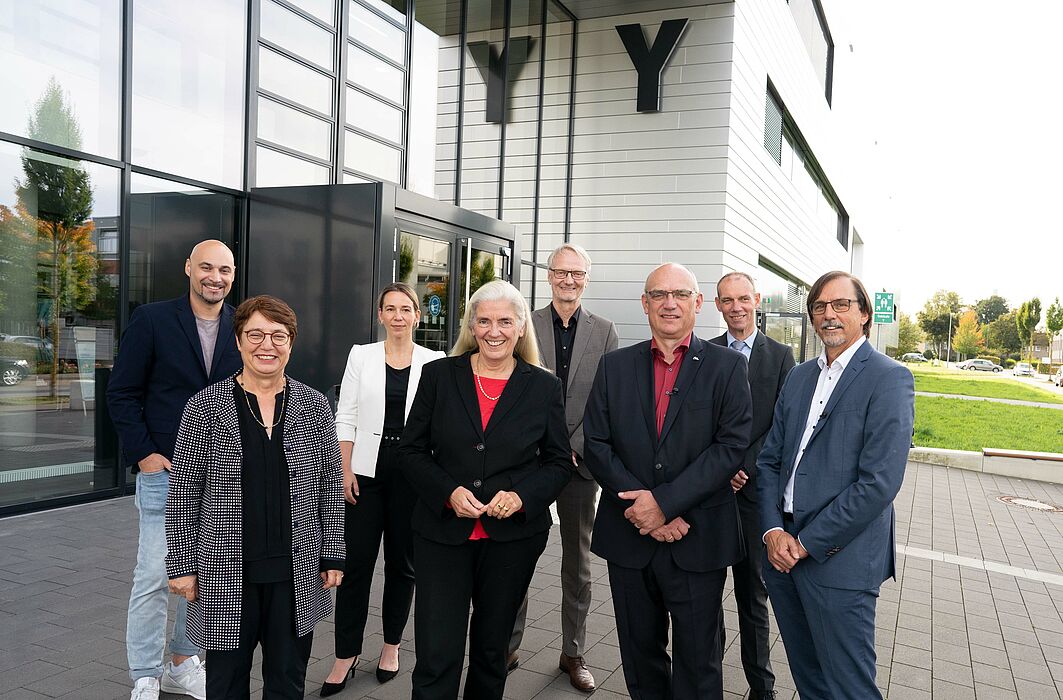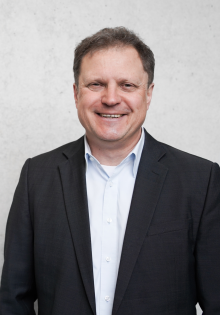North Rhine-Westphalia’s Science Minister visits Paderborn University
Not content with its activities spanning numerous forward-looking fields of research, Paderborn University has a keen eye on the social relevance of its scientific endeavours, too. Sustainability and digital transformation are fundamental aspects of “Work 4.0,” an initiative that puts people at the heart of modern technology. As part of her research journey under the heading “#möglichmacher” (#makeithappen), North Rhine Westphalia’s Culture and Science Minister, Isabel Pfeiffer-Poensgen, is visiting the state’s leading researchers. On Friday, 1st October, she stopped off in Paderborn to speak to scientists from the university.
Interdisciplinary research leads to successful technology transfer
“New technologies alone are not enough to achieve sustainable solutions within the world of work. Their use needs to be tailored towards people if they are to enable a successful technology transfer. Interdisciplinary projects running within Paderborn University for the past few years have been connecting technological and social aspects,” explains University President, Professor Birgitt Riegraf during the minister’s visit. Which is why, Reigraf continues, she is so delighted at the considerable recognition Paderborn’s scientists are receiving from the political sphere.
“North Rhine-Westphalia is home to many exceptional scientists whose projects and ideas improve people’s lives in our region. Paderborn University, with its focus on “Work 4.0” is an excellent example: Scientists from quite distinct disciplines each bring their skills to the table. Together, they take a holistic look at the question of how our world of work is going to change and develop in the coming years, both technologically and socially. This benefits people in North Rhine-Westphalia and beyond,” Science Minister Isabel Pfeiffer-Poensgen explained during her visit.
What does “Work 4.0” look like?
Ms Pfeiffer-Poensgen took a walk through the state-of-the-art Y-shaped building, making four stops along the way to gain insight into Paderborn University’s cutting-edge research. Post-graduate students from a number of fields who work together in the Collaborative Research Centre NRW (NRW-Forschungskolleg) on “Shaping flexible working environments. People-centred use of cyber-physical systems in Industry 4.0,” led by Professor Gregor Engels, presented their research into the use of intelligent assistance systems at work.
Artificial intelligence (AI) was at the heart of leading-edge cluster “it’s OWL”’s work. Paderborn University’s Heinz Nixdorf Institute has been working on specific solutions for industry as well as small and medium-sized businesses, for example, by using augmented reality (AR) to develop virtual workplaces. Professor Roman Dumitrescu and Florian Dyck demonstrated, among other things, how AR glasses can be used to test individual steps of an installation under realistic conditions.
In the focus area, “Sustainable Materials, Processes and Products,” scientists from the fields of engineering, chemistry and physics are researching innovative technologies for manufacturing processes. In his presentation, Professor Mirko Schaper demonstrated that lightweight construction, in particular, is a key technology with considerable potential to conserve resources.
The Science Minister concluded her tour by finding out about the fledgling collaborative research centre/Transregio (TRR), “Constructing Explainability,” on the subject of “The explainability of artificial intelligence.” In collaboration with Bielefeld University, Professor Katharina Rohlfing’s team of researchers are aiming to improve human-machine interaction and promote understanding of how algorithms work.
“Today’s presentations have shown that, in Paderborn, we are well positioned not just in terms of basic research, but also with regard to applied research. Our scientists are bringing tomorrow’s world of work to life today,” Riegraf sums up.
The research tour “#möglichmacher” (#makeithappen)
In the course of her research tour, “#möglichmacher” (#makeithappen), NRW’s Science Minister Isabel Pfeiffer-Poensgen will be visiting eight scientific establishments within her own state between September 2021 and February 2022. The visits will cover a broad range of topics to document both the diversity of leading-edge research in North Rhine-Westphalia and the impact of research funding. Münster, Bonn and Bochum are some of the next stops on her tour. In the coming weeks, a video of Pfeiffer-Poensgen’s visit to Paderborn University will be published on the ministry’s digital channels.


